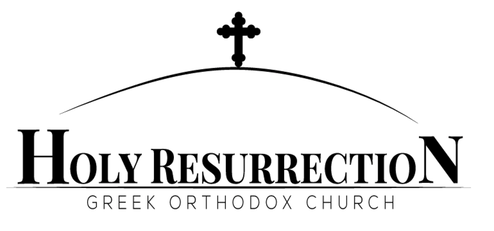*********************
Dear Beloved in Christ,
Each liturgical year begins and ends with a feast of the Theotokos. Last month we celebrated her falling asleep (August 15). This month - as we begin the new year on September 1 - we celebrate her nativity (September 8). The entire story of our salvation through Jesus Christ is told within the lifespan of the Theotokos.
On the Annunciation, the Archangel Gabriel came to Mary and announced the good news of God's desire to save humanity through His Incarnation. Mary's final words to the angel were, "Let it be to me according to your word." (Luke 1:38) With these words, she united humanity with divinity. She became the Theotokos, and God became her Son by receiving human flesh from her.
The Panagia's assent restored humanity, which had been estranged from God through the choice of Adam and Eve. Thus she became the New Eve, the one who kept her will in union with God's will.
At the very core of our Faith is this same freedom and choice that each of us face: Do we unite ourselves with God's will, or do we choose to depart from Him? It is a choice that is made each and every day, many times throughout the day. If we love God and choose to be in harmony with the divine will, then we move toward life and immortality; if we do not and we choose the opposite, then the natural outcome is death and corruption.
We have complete freedom - a freedom is given to us by God, who does not compel or impose or demand. Orthodox Christianity has no requirements. All of the commandments of God, the teaching of Jesus, the canons of the Church, the writings of the Holy Fathers, the practices of the Faith, are not requirements. They are invitations. If we desire communion with the All-Good God, then we follow these; and the more that we follow them (in the right spirit), the more that we participate in divine grace, becoming sanctified. However we are free to reject the invitations. Jesus said, "He who would come after me, let him deny himself..." not "You must come after Me and you better deny yourself!"
God has given us absolute freedom because He desires our love - and love can only exist where there is freedom. Love cannot be coerced, demanded, or taken, or it ceases to be love. Anything that is called "love" but is imposed or is filled with expectations and demands is not love.
Imagine a church where the priest says, "Did you give your 10 percent?" or asks at the chalice, "When was your last confession and did you complete your communion prayers?" or demands to know exactly how each parishioner follows the fast. (We may know of denominations or religions like this...) You can see how essential freedom is, so that love can exist.
In our society today, we have many things that are called "love." People demand that we love them through this action or that allegiance. They tell us, "If you love me, then you will..." Yet the opposite is always implied: "You do not have love unless you do this," or "If you don't do this, then I will resent or hate you."
As Christians, we are to have no expectation of love from others. Regardless of whether others love us or not, we express our love outward toward others, with no expectation of reciprocity. It is foreign to our Faith that we would expect or demand actions from others for the sake of their "love" for us, or as a condition of our love for them. Our Lord has no expectations of love. He ceaselessly gives of Himself out of His love for us, irrespective of what we do or don't do for Him. He has no demands and He never coerces.
Love is a voluntary movement outward, and it can only exist where there is freedom - the freedom of a person to reject or accept the love. If it is love, it will bear the rejection or embrace the acceptance.
We cannot have expectations of others. When we do, we move out of the realm of love and into the realm of judgment or of coercion: Others don't do what we expect or demand, then we judge them or we try to make them change. Thus division is borne out of our own expectations. This is the way of the world, and it must be rejected. Let nothing come between the love that we have for one another! "Bear one another's burdens and so fulfill the law of Christ." (Galatians 6:2).
We live in a time when our Christianity is put to the test, when the limits of our love are put to the test - even by our own brothers and sisters in Christ. We must ask ourselves: Do I love as Christ loves? Or do I judge, putting myself above others? "By this all will know that you are My disciples, if you have love for one another." (John 13:35).
The only path of the Christian is the path of Christ: self-sacrificial love that makes no demands and does not require love in return. Just as Christ loves us whether we hate Him or love Him, so likewise we must love others irrespective of how they feel about us or what they do to us.
May our parish community continue to emulate Christ in His self-sacrificial love, in a spirit of freedom rather than coercion. May we "judge not, lest we be judged and condemn not, lest we be condemned." (Luke 6:37) May we bear with one another in love, "endeavoring to keep the unity of the Spirit in the bond of peace" (Eph 4:1-3) having no expectations or demands of others.
In this community of love and of freedom we shall be sanctified!
*********************
In Christ,
Fr. Steve


 RSS Feed
RSS Feed